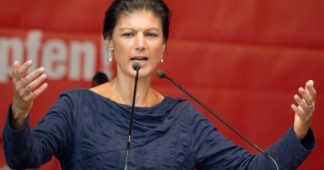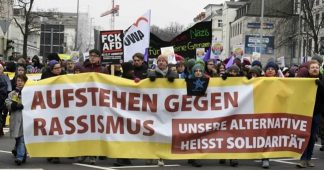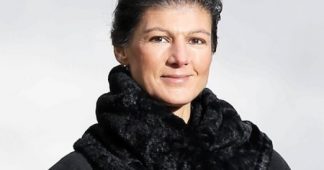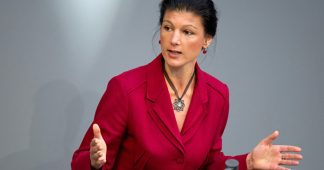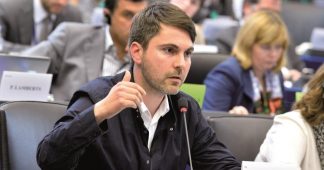By Klaus Dräger *
In February 2018 Oskar Lafontaine wrote: “Do we need a movement of the political left accumulating broader forces (Sammlungsbewegung)? Yes, if we want social cuts to be halted, wages and pensions to rise again, foreign policy to reinstate Willy Brandt’s policy of detente, and the progressive destruction of our environment and species extinction to be stopped.” His analysis of the results of the German national election of autumn 2017 was that DIE LINKE Party with 9.2 per cent is too weak to challenge the rise of the political right and to fill the vacuum that the decline of the SPD has created. Pointing out Bernie Sanders in the U.S., Jeremy Corbyn in the UK or Jean-Luc Mélenchon’s La France Insoumise as new successful attempts to create broader movements against neo-liberalism by mobilising via social media, he called: “Left, unite!” The aim is to appeal especially to those who have been disappointed and disillusioned for many years and who don’t see themselves represented any longer by the current political spectrum.
Sahra Wagenknecht (co-chair of DIE LINKE group in the German national parliament, the Bundestag), argued along the same line as her husband Lafontaine in numerous interviews and articles. Together with Bernd Stegmann, a theater director, Wagenknecht announced on 6 August 2018 her intention to launch a new ‘movement’ called ‘Aufstehen!’ (Stand up!): “In order to be able to make a different policy in Germany, other majorities are needed. To regain these, there must be a left-wing rallying movement that has the courage to engage with the powerful actors. The basis of such a movement is the classic social democratic tradition that politics cares about the material living conditions and ensures that they are good for all people and the opportunities are equally distributed.”
From interviews to the ‘appeal’
They created a website of ‘Stand Up!’, calling on people to register to the new movement via Internet – in the first weeks even without any political platform being presented. Just carefully manufactured video statements from ‘normal people’, why a profound change of policy in Germany is necessary, was all that was presented. For weeks, there was absolute silence who (except Wagenknecht and Stegmann) is ‘behind’ this initiative. Finally, as presented at a well attended press conference on 4 September 2018, the co-initiators of that appeal are e.g. Marco Bülow (MP, SPD), Ludger Volmer (the former chair of the Greens in the 1990ies), Antje Vollmer (Greens, former vice-president of the German national parliament 1994 – 1998), Fabio De Masi (MP, DIE LINKE), trade unionists, academics such as Wolfgang Streeck, writers and artists. ‘Stand Up! was able to gather all in all quite a broad spectrum. As of October 2018, ‘Aufstehen!’ claims to have gained about 150.000 registered supporters, most of them without any party affiliation. Currently its focus seems to be to create local groups and start discussions about what to do next.
Vague political platform
The appeal states clearly that ‘Stand Up!’ does not want to create a new party, but considers itself as a (cross-party) movement open to anybody (party-affiliated or not) who supports its aims. The political platform of ‘Stand Up!’ is quite vague and mildly social democratic. It focuses on rebuilding and strengthening the welfare state, protecting the environment, stopping privatization and neo-liberal de-regulation and so on. It’s perhaps clearest message is calling for peace and detente with Russia (which is currently not so much supported by Social Democrats and Greens in Germany). Wagenknecht’s wing within DIE LINKE has strong controversies with the party’s majority on issues such as the European Union and the Euro regime (Lafontaine and Wagenknecht supporting Lexit and PlanB orientations) and on migration policy (Wagenknecht arguing against the concept of open borders).
On EU issues, the appeal states: “A European Germany in a united Europe of sovereign democracies. The European Union should be a space for protection and organization, but not a catalyst for market-radical globalization and the erosion of democracy. European politics needs democratic legitimacy.” On migration, it demands: “Ensuring the right to asylum for the persecuted, stopping arms exports to areas of tension and ending unfair trade practices, helping war and climate refugees, tackling hunger and poverty on the ground and creating prospects in their home countries. Through a new world economic order, guaranteeing the life chances of all peoples at a high level and in line with the available resources.”
Economist Heiner Flassbeck (editor of Makroskop) is quite disappointed about the current appeal (‘beautiful words, but few content’). On Europe, he comments: “The European Union should not be a catalyst for market-radical globalization, states the paper. So what? Not a word about the great tensions between Germany and the countries of Southern Europe, not a word about the devastating German role in the monetary union, not a word about the necessary new economic policy and the reduction of Germany’s current account surplus, not a word about the future and the all-important question, such as how Germany should position itself to prevent the collapse of Europe.”
However, the initiators of ‘Stand Up!’ claim that the current appeal is not final and that there will be debates with the grass roots supporters to develop a programmatic platform of the ‘movement’. So what will be next for ‘Aufstehen!’? A phase of organizing and programmatic debate? What will be its future trajectory?
Options under discussion (or feared)
Is ‘Aufstehen!’ about creating a broad left-wing movement (with conferences, debates, mass mobilisations, demonstrations) to counter right wing street movements such as PEGIDA (the anti-Muslim and xenophobic alliance in Germany working closely with the hard right AfD as their parliamentary wing)? Will it be focusing on extra-parliamentary activities to create a momentum for shifting policies in Germany to the left? We shall see …
Some of its initiators discuss the idea to put pressure on DIE LINKE, the Greens and the SPD to put candidates from ‘Stand up!’ on those parties electoral lists, in the hope that those might be able to jointly re-conquer lost space amongst voters. However, ‘Stand up’s’ Green representatives such as Ludger Volmer and Antje Vollmer have only a very marginal influence within the current German Greens. The moderate German Greens are flying high in opinion polls (15 to 17 per cent) with an orientation to become a major party of the ‘extreme centre’, future coalitions with conservatives (Jamaica-like) included. Also, ‘Stand Up’s’ representatives coming from the SPD are quite isolated within their own party. In my view, this approach is not very realistic.
The crucial question for many political observers is this: the real (still hidden) long-term project of Stand Up! could be to create a social democratic ‘left populist’ party, using Internet and social media mobilisation, if it can consolidate and establish itself. As mentioned by Lafontaine earlier on, the templates for this are ‘Mélenchon’s La France Insoumise , Momentum linked to Jermy Corbyn as Labour leader in the UK, or Podemos in Spain. This seems to be the dream of Wolfgang Streeck (one of ‘Stand Up’s’ prominent initiators): “There is very little to distinguish many leftwing members of the SPD from the non-sectarian wing of Die Linke, and the same holds for many non-voters. All could find an electoral home in a new combination of leftist Social Democrats and the realistic wing of Die Linke.” In Streecks view, Lafonatine and Wagenknecht are that ‘realistic wing’. But not the self-proclaimed ‘realists’ from eastern Germany such as Gregor Gysi and his followers, which for decades preached about the need for compromise, moderation and ‘Red-Red-Green’ (R2G) coalitions. This happened in Germany’s eastern ‘Länder’, and proved to be disappointing – DIE LINKE losing many votes to the hard right AfD in the East, because it is regarded (quite justifiedly) as being part of ‘the establishment’. The perspective of a new party formation emerging from ‘Stand Up!’ is thus the main fear of the current majority of DIE LINKE, whose executive committee (Bundesvorstand) distanced itself from that project.
All that told, splitting DIE LINKE along those lines is a risky endeavour, if ‘Aufstehen!’ should not be able to compensate that by organizing a much broader and radical left wing political base (as with the Corbyn project). Currently, programmatically it represents a ‘weak social democracy’, if at all. The Greens are becoming more and more one of the main pillars of the German ‘extreme centre’ (Tariq Ali), the SPD is unable to renew itself and in free fall. And the two other more or less ‘left social democratic’ formations in Germany (such as DIE LINKE and possibly ‘Aufstehen!’) each receiving something about or above 5 per cent of the vote – this does not look like initiating a ‘left turn’ of German politics.
There is also a certain irony in all this: in former times, Wagenknecht and Lafontaine were very sceptical about R2G – rightly in my view – pointing out its failures to combat neo-liberalism and strongly criticizing the R2G oriented wing of DIE LINKE. Now, it seems, that ‘Stand Up!’ tries to promote a ‘new’ strategy for forging an R2G electoral and governmental alliance, which in my view is based on a lot of ‘wishful thinking’.
Which of the options discussed above ‘Stand Up!’ will follow, is far from clear at the current stage. Whether the new ‘movement’ will be able to create some extra-parliamentary momentum to push German politics leftwards also remains to be seen. To cite the famous literary critic Marcel Reich-Ranicki (1920 – 2013): “The curtain is closed and all questions open”.
* Klaus Dräger worked for the group of the European United Left/ Nordic GreenLeft as staff co-ordinator in the European Parliament’s Committee on Employment and Social Affairs; now retired. He is a member of the advisory board of the German magazine ‘Z’ (Zeitschrift Marxistische Erneuerung ZME; Journal Marxist Renewal).
